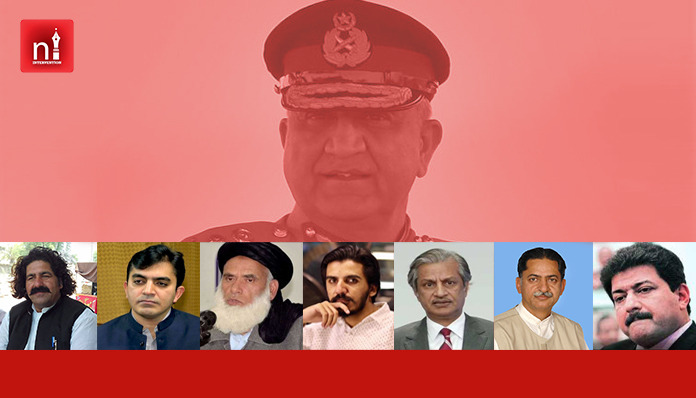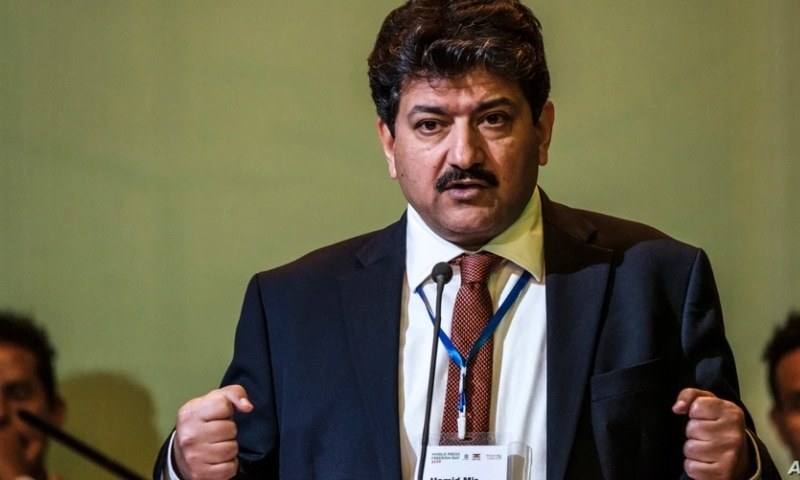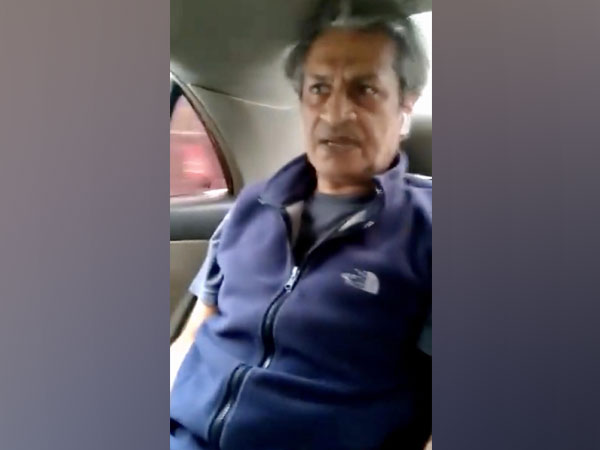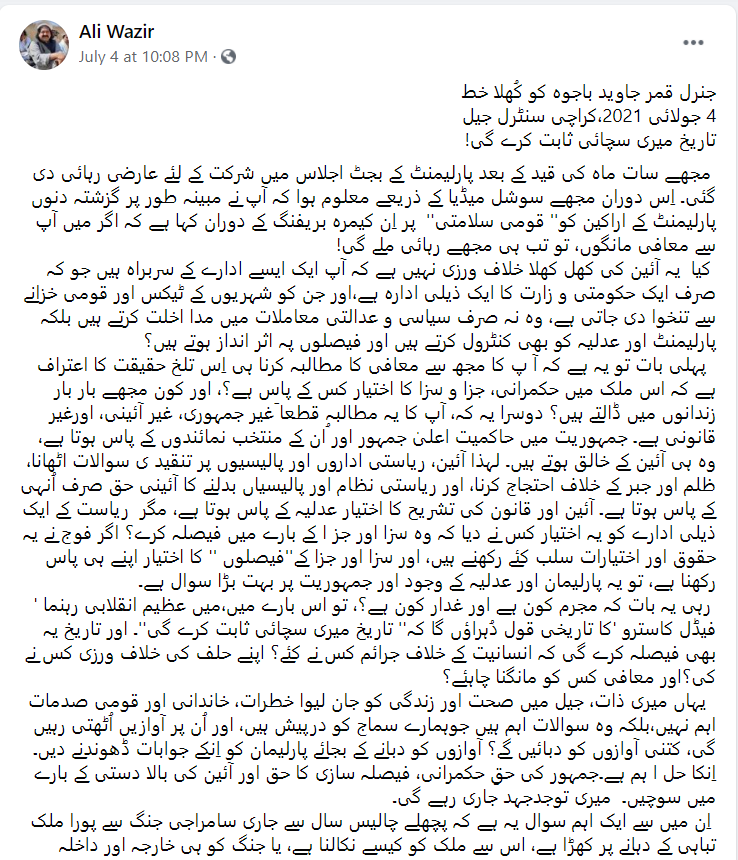
Freedom of speech and expression is the hallmark of a democratic state. Totalitarian regimes run by military dictators muzzle free speech, put curbs on criticism and eliminate dissenters or throw them away into torture cells. Ditto in Pakistan.
Pakistan Army that has been ruling Pakistan with an iron hand for the last seven decades ensures that no one ever dares to speak against them in the country. Islamabad as a seat of ‘democratically elected’ government is merely a smokescreen created by Rawalpindi. Real power rests with Pakistan Army that takes all important decisions for the country, from foreign policy to economic matters on behalf of the ‘selected’ government installed in Islamabad. And yet, despite this back seat driving, the GHQ Rawalpindi cannot tolerate questions or criticism about itself.
Journalists, political commentators, columnists, activists et al in Pakistan know quite well that raising questions, even in hushed tones, about the decisions of Rawalpindi would result in deadly attacks from the ISI-backed goons. Pakistani media, therefore, forbids any kind of critical views about the army and/or shuns anybody even remotely associated with outspoken critics.
No one is supposed to break this mafia-like code of omertà. The stakes are too high and Pakistan Army or the ISI never care about the stature or public standing about the critic and swiftly take action against him/her.
Murderous attempts on Journalists
Senior Pakistani journalist Hamid Mir has been facing attacks for the last several years only because he had been courageously questioning Rawalpindi’s actions. Attempts were made to assassinate Hamid Mir in 2014 at Karachi, when he raised the issue of Baloch “Missing Persons” in Pakistan’s mainstream media. Six bullets were fired on him, but he was lucky to survive this attack. Four bullets were surgically extracted, while two bullets are still embedded in Mir’s body.
A bomb was then planted under Hamid Mir’s car in Islamabad, which was defused before it could explode.

Days before these attacks Hamid Mir had written to his employer Jang Media group and officials in the Pakistan government that there was a threat to his life and his family. Mir had also said in his letter that if he was attacked then the responsibility would squarely lie with Lt. Gen. Zaheerul Islam, the then ISI chief.
Hamid Mir’s complaints had no effect on the plans of ISI or Pakistan Army. They had to teach a lesson to Mir who had ‘dared’ to go against Pakistani generals and so he was attacked.
Hamid Mir had courageously raised the issue of Baloch ‘Missing Persons’ in media and shown evidence of ISI and other intelligence agencies’ involvement in the enforced disappearances of innocent Baloch people.
Another senior Pakistani journalist Absar Alam was shot at in Islamabad and grievously injured. Absar Alam is not a rookie reporter, mind you, rather former chairman of Pakistan Electronic Media Regulatory Authority (PEMRA) and has an experience of about three decades in journalism. The only crime of Absar Alam was that he too dared to speak against the Pakistan Army.

Another journalist who has been vocal against the atrocities committed by Pakistan Army and their loot is Asad Ali Toor. And he too was attacked by ISI-backed goons. Three armed men broke inside Toor’s house in Islamabad brazenly shouting “Long live Pakistan Army, long live ISI”. The attackers made no attempt to conceal their identity and ordered Asad Ali Toor to never criticize or question Pakistan Army in his video reports.
When Toor refused to accept their orders he was severely tortured. The attackers threatened him with painful death if he did not stop criticism of Pakistan Army’s actions.
Asad Ali is a journalist and vlogger (video blogger) who criticizes the wrong and undemocratic actions of the government and civil establishment, including the Pakistan Army, its officers and the political leadership.
Attack on Asad Ali Toor was widely criticized and Pakistanis erupted with anger on social media. Hamid Mir addressed a rally in support of Asad Ali Toor in Islamabad, where he warned the state agencies that no journalist in Pakistan should be subject to such violence. Mir said if this violence did not stop then journalists would expose what goes on inside the homes of Pakistani generals. Mir added that he would be forced to say why the wife of a Pakistani general shot at him.
A couple of days later Hamid Mir’s news show was dropped at Geo Television under pressure from Rawalpindi.
As per a Media Freedom Report released by Council of Pakistan Newspaper Editors (CPNE), at least ten journalists were murdered and several others attacked, kidnapped, tortured or arrested across Pakistan under fabricated charges in the year 2020.
Several social media reports and local language newspapers peg this figure a tad higher and say that more than forty Pakistani journalists, local politicians, social activists and social media activists have lost their lives while many others live in constant fear of retaliation. The names included in this exhaustive list are Ahmad Nawarani, Matiullah Jan, Asad Ali Toor, Absar Alam, Hamid Mir, Nadeem Malik, Zafar Naqvi and Rizwan Razi, among several others.
The situation is much worse in occupied Balochistan where forty four journalists who were reporting about the atrocities of Pakistan Army have been silently eliminated through targeted murders.
Backdoor legislations to muzzle criticism of Pakistan Army
The subtlety and shrewdness with which Pakistan Army imposes totalitarianism in Pakistan is often missed by the civilised world. Unlike other military dictators who impose their will blatantly, Pakistan Army camouflages it under different layers and gets a democratic sanction to its actions.
A couple of months ago the National Assembly Standing Committee on Interior passed a bill that allows two years imprisonment and/or fine upto five lakh rupees on anybody who questions Pakistan’s armed forces.
The introduction of this dubious bill, its terms and conditions and the pattern of voting, all bear the unmistakable stamp of Pakistan Army.
It all started with the introduction of a private member bill by the National Assembly member Amjad Ali Khan of the ruling political outfit Pakistan Tehreek-e-Insaf (PTI). This was named Criminal Law (Amendment) Bill that sought to amend the Pakistan Penal Code 1860 and the Code of Criminal Procedure 1898. It must be noted that Imran Khan, the current ‘selected’ Prime Minister of Pakistan is from the PTI.
Before the enactment of this bill the Section 500 of Pakistan Penal Code had provisions for defamation but did not explicitly mention the Pakistan’s armed forces. The text of Section 500 Pakistan Penal Code read: “Anyone who brings disgrace or disgrace to another can be sentenced to two years imprisonment or a fine or both.”
PTI member Amjad Ali Khan’s private bill sought to amend Section 500 by adding a sub-clause Section 500-A. The amended text read “punishment for intentional mockery of the Armed Forces etc”. The wording of this sub-clause was deliberately kept ambiguous to enable GHQ Rawalpindi to act on their whims.
Further, during meetings of Standing Committee on Interior the members of opposition parties Pakistan Muslim League-Nawaz (PML-N) and Pakistan People’s Party (PPP) opposed this draconian bill and also voted against it. Five votes were cast in its favour and five against this bill. However, the casting vote rested with Raja Khurram Nawaz, a representative of Pakistan Tehreek-e-Insaf (PTI) and the chairman of Standing Committee on Interior. And with Raja Khurram Nawaz’s casting vote this draconian bill was enacted as a law in Pakistan.
Under this new act Pakistan’s armed forces and their personnel can target any journalist, politician, author, social media activist, social worker etc. citing ridicule, insult and defamation of Pakistan Army. And all of this will be done according to a legislative law enacted by a democratically elected, nay selected, government in Islamabad.
Representatives of the PML-N and the Pakistan People’s Party (PPP) who opposed the bills said that freedom of expression would be further curtailed under the guise of this new law across Pakistan. Soon after the bill’s approval by standing committee, several people took to social media to express their concern over it.
Undeterred by social media outrage the Pakistan Army has already begun the misuse of this law.
Cases of treason have begun to be registered against journalists with lightening speed. For instance, the Punjab Police registered a case of incitement against Pakistan Army on Absar Alam, senior journalist and former chairman of the Pakistan Electronic Media Regulatory Authority (PEMRA). The police have also slapped a case of treason under Article 6 against him.
Similarly, a case has been registered against Bilal Farooqi, journalist and social media activist in Karachi for inciting revolt against Pakistan Army and spreading religious hatred.
Thereafter, the Rawalpindi Police registered a case against vlogger and journalist Asad Ali Toor for insulting, posting and commenting on Pakistani institutions, especially the army.
Criminal Law (Amendment) Act passed by the Pakistan’s civil administration under Imran Khan is, in reality, a deadly instrument in the hands of GHQ Rawalpindi through which they are now legally targeting journalists and activists across Pakistan.
Politicians and elected Parliamentarians on target
Pakistan Army’s obsession of curbing dissent is not limited to action against journalists and social media activists, rather any politician who refuses to sing the same tunes has to face the music from GHQ Rawalpindi.
Pakistan Muslim League-Nawaz (PML-N) National Assembly member Javed Latif has been punished for speaking out against the Pakistan Army. Latif had said that Maryam Nawaz, daughter of former Prime Minister Nawaz Sharif, lives under constant threat of being killed by the military establishment. After this statement Javed Latif was declared a traitor and was sent to jail.
Similarly, Mufti Kifayatullah, a senior leader of Jamiat Ulema-e-Islam, was criticized by the intelligence agencies for his utterances and kept in the torture cell for two months before being released. He was in jail for over five months.
Mufti Kifayatullah in an interview to a news channel in December 2019 had criticized the Pakistan Army and said that if theft has to be caught, then the generals of Pakistan Army must be caught. In this same interview, Kifayatullah had said that if government has courage, then former head of Pakistan Army’s public relations department (Inter-Services Public Relations) Lt. Gen Asim Saleem Bajwa must be arrested and his right hand be chopped off.
Mohsin Dawar and Ali Wazir, members of the Pashtun Tahafuz Movement (PTM) have also suffered severe retaliation for criticizing the Pakistan Army.
Ali Wazir’s torture by Pakistan Army
Ali Wazir represents Waziristan and Khyber Pakhtunkhwa. He is an elected representative in the National Assembly from Waziristan and a prominent Pashtun leader. Pakistan Army sees Ali Wazir as a major impediment in its strategy of breeding Taliban in Waziristan and other parts of Pashtunistan. Rawalpindi was desperately looking at an excuse to target Ali Wazir, and it found one at a public rally of Pashtuns.
Addressing a public rally, Pashtun leader Ali Wazir slammed the Pakistan Army’s use of force against unarmed people in Waziristan, burning of Pashtun houses, wanton killings and human rights violations across Pashtunistan.
Gen Qamar Javed Bajwa took Ali Wazir’s speech as a personal attack and thereafter named Ali Wazir in a fake land grabbing case and arrested him. Ali Wazir was also handcuffed and dragged on the roads in front of the Pashtuns, whom he represents in Pakistan’s parliament. All of this was done on the directions of Gen Bajwa to teach a lesson to the Pashtuns so that they refrain from speaking against the Pakistan Army.
Pakistani parliamentarians recently attended a secretive meet on national security at Parliament House Islamabad. This meeting of elected representatives of Pakistan was chaired by Gen Qamar Javed Bajwa and current ISI chief Lt Gen Faiz Hameed. During this meeting Shahid Abbas Khaqan, former prime minister, told Gen Bajwa that he was sad to see an elected parliamentarian, Ali Wazir, being handcuffed and paraded in front of the people he represents.
PPP chairman Bilawal Bhutto Zardari also pleaded with the army chief to release Ali Wazir. With folded hands Bilawal Bhutto requested Gen Bajwa that several people in Ali Wazir’s family have been killed and he is an elected parliamentarian who must be released.
But Gen Bajwa did not budge. On the contrary he shot back saying that if Ali Wazir apologizes then he can think about releasing him.

Upon hearing that Pakistan Army chief has demanded an apology, Ali Wazir wrote an open letter addressing General Qamar Javed Bajwa from jail in which refused to apologize and questioned Bajwa’s locus standi to demand apology from an elected representative.
“Isn’t it an open violation of the Constitution that you are the head of an institution that is just a sub-institution of government, and the government pays your salaries through national treasury after collecting citizens’ taxes. … They interfere in judicial matters but also control the parliament and the judiciary and the decisions are influenced… The first thing is that your demand of seeking apology from me… who has the power to rule, reward and punishment in this country?, And who put me in prison again and again? (sic)” questioned Pashtun leader Ali Wazir in his open letter to Gen Qamar Javed Bajwa.
Ali Wazir further stated in his open letter: “…your demand is absolutely undemocratic, unconstitutional and illegal. In a democracy, sovereignty is vested in its elected representatives. They are the creators of the constitution. Therefore, they have the constitutional right to raise critical questions about the constitution, state institutions and policies, to protest against oppression and repression, and to change the state system and policies…. Who is the culprit and who is the traitor? So in this regard, I will repeat the historical statement of the great revolutionary leader Fidel Castro that ‘history will prove my truth’. And history will also decide who committed crimes against humanity. Who violated his oath? And who should apologize? (sic),” asked Ali Wazir in his open letter.
If Pakistan is indeed a democratic state, then everyone should have the right to freedom of expression, but this is not at all the case. For the last seventy years, the Pakistan Army has been targeting journalists, politicians, government employees, bureaucracy, social activists, judiciary and lawyers in the name of national security and protection of Islam. A public perception has been created by Rawalpindi that every professional and all state institutions, except the Pakistan Army, are corrupt and it’s the military that’s the saviour of Pakistan and Islam.
However, gradually the stories about Pakistan Army’s systematic corruption, blackmail and two-timing have surfaced and thus common Pakistanis have understood the root cause of all rot within the country.
People have started questioning the generals about the source of their massive wealth. In its response the Pakistan Army has launched a full-scale crackdown on every critic who raises questions about rotting corruption in Rawalpindi.
